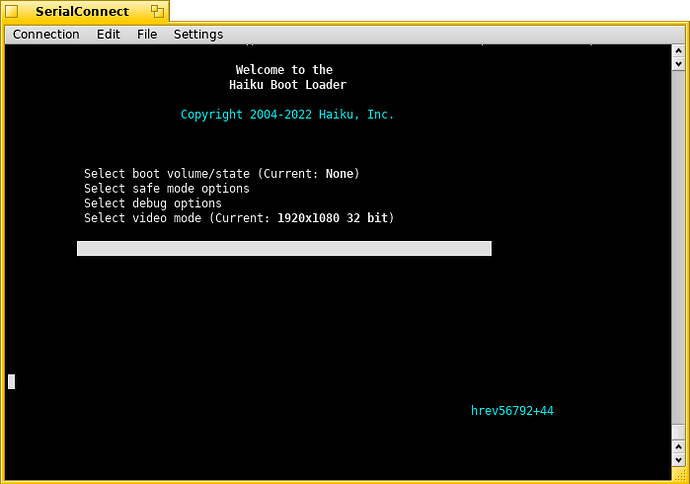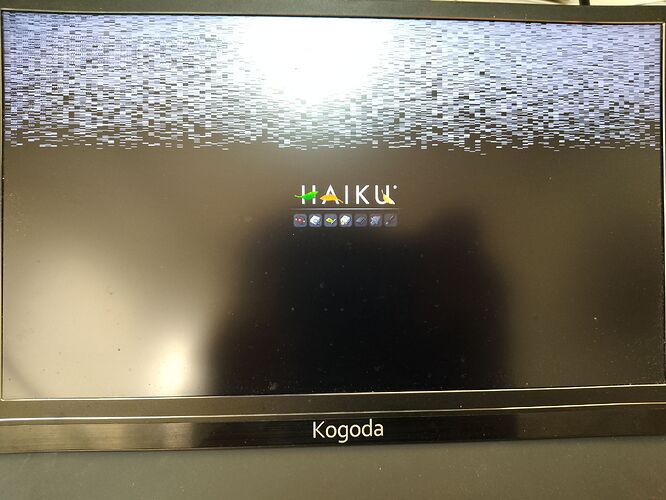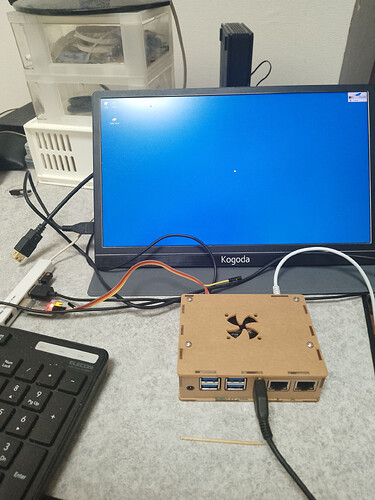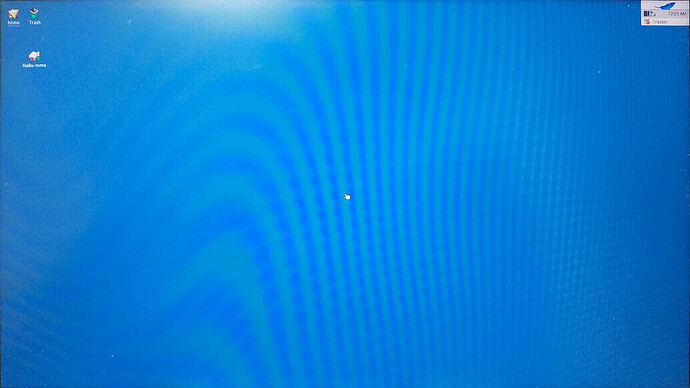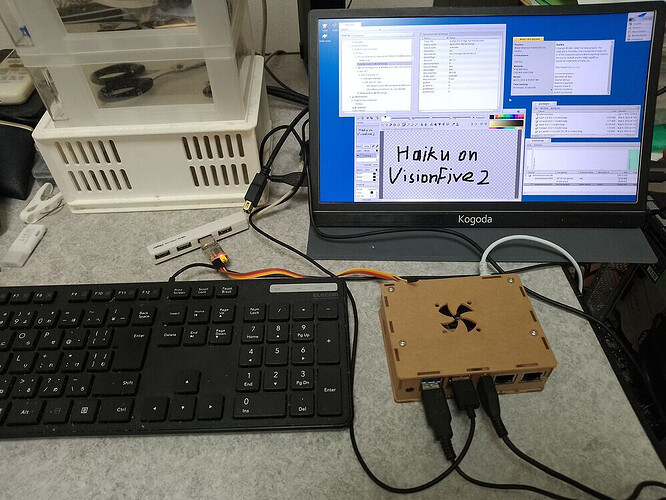A developer named " X512" have made some progress on running Haiku on VisionFive 2, the following is his post:
I recently got VisionFive 2 RISC-V board and trying to run Haiku on it.
Current recommended U-Boot version that come with default Debian distro do not supports USB or NVMe boot yet, so I am using SD card for now. It should be possible to start Haiku booting from SD card with Haiku EFI boot loader and kernel with boot drivers and then continue Haiku booting from USB/NVMe when kernel will load PCI/XHCI/NVMe boot drivers.
Hopefully U-Boot have built-in framebuffer support (but with some update artifacts, maybe some write alignment is needed), so it should be possible to boot into Haiku desktop without writing dedicated video drivers.
I currently managed to boot until “PANIC: did not find any boot partitions!” stage. Next it will be needed to write PCI host controller driver (PLDA PCI (linux/pcie-plda.c at JH7110_VisionFive2_devel · starfive-tech/linux · GitHub )) to get USB/NVMe working and continue booting.
![]()
Log:
arch_smp_boot_other_cpus(0x80000000000c8d01, 0xffffffc00209878e)
hart status:
hart 0: started
hart 1: stopped
hart 2: stopped
hart 3: stopped
starting CPU 2
stack: 0xffffffc0026ea000 - 0xffffffc0026eefff
a rsctha_rctpiu_nge nCtPrUy 23(2
)
stack: 0xffffffc0026ef000 - 0xffffffc0026f3fff
a r csht_acrtpui_negn tCrPyU 2(43
)
stack: 0xffffffc0026f4000 - 0xffffffc0026f8fff
a r chhar_ctp us_teanttusry:2
(
4 )
hart 0: started
hart 1: started
hart 2: started
hart 3: started
arch_enter_kernel(satp: 0x80000000000c8d01, kernelArgs: 0xcc591c48, kernelEntry: 0xffffffc00209878e, sp: 0xffffffc00280b000)
Welcome to kernel debugger output!
Haiku revision: hrev56792+44, debug level: 2
vm_translation_map_init: entry
physical memory ranges:
40080000 - 47ef1000
47f0f000 - c0110000
c0200000 - cb579000
cb57a000 - cb57d000
cb580000 - cb581000
cb585000 - ccda4000
ccda5000 - 240000000
allocated physical ranges:
c7a2f000 - c9513000
c9514000 - cb514000
cb593000 - ccda4000
ccda5000 - f0000000
f2000000 - 100000000
allocated virtual ranges:
10000000 - 10010000
c8d02000 - c9513000
c9514000 - cb571000
cb579000 - cb57a000
cb57d000 - cb580000
cb581000 - cb585000
cb593000 - f0000000
f2000000 - 100000000
ffffffc002000000 - ffffffc006831000
fffffffe00080000 - 0
kernel args ranges:
ffffffc002000000 - ffffffc002010000
ffffffc00226e000 - ffffffc002309000
ffffffc00235d000 - ffffffc00236d000
ffffffc002399000 - ffffffc0023a9000
ffffffc0023cc000 - ffffffc0023dc000
ffffffc002479000 - ffffffc0024a6000
ffffffc0024b7000 - ffffffc0024c7000
ffffffc002507000 - ffffffc002517000
ffffffc002556000 - ffffffc002566000
ffffffc00258d000 - ffffffc00259d000
ffffffc0025ca000 - ffffffc0025da000
ffffffc00265a000 - ffffffc00266a000
ffffffc002693000 - ffffffc0026b0000
ffffffc0026ce000 - ffffffc0026de000
ffffffc0026f9000 - ffffffc002705000
physMapBase: 0xfffffffe00080000
physMemBase: 0x40080000
mark_page_range_in_use(0x0, 0x40080): start page is before free list
reserve_boot_loader_ranges(): Skipping range: 0x0000000010000000, 65536
reserve_boot_loader_ranges(): Skipping range: 0x00000000c8d02000, 8458240
reserve_boot_loader_ranges(): Skipping range: 0x00000000c9514000, 33935360
reserve_boot_loader_ranges(): Skipping range: 0x00000000cb579000, 4096
reserve_boot_loader_ranges(): Skipping range: 0x00000000cb57d000, 12288
reserve_boot_loader_ranges(): Skipping range: 0x00000000cb581000, 16384
reserve_boot_loader_ranges(): Skipping range: 0x00000000cb593000, 614912000
reserve_boot_loader_ranges(): Skipping range: 0x00000000f2000000, 234881024
vm_translation_map_init_post_area: entry
SBI spec version: 0x1000000
SBI implementation ID: 0x1
SBI implementation version: 0x10002
SBI vendor ID: 0x489
SBI arch ID: 0x8000000000000007
arch_smp_init()
allocate_commpage_entry(2, 16) -> 0x0000000000000200
timerFrequency: 4000000
system_time_conversion_factor: 1073741824
arch_vm_init_end(): 1 virtual ranges to keep:
start: 0xffffffc002811000, size: 0x4020000
scheduler_init: found 4 logical cpus and 0 cache levels
scheduler switches: single core: false, cpu load tracking: false, core load tracking: true
scheduler: switching to low latency mode
slab memory manager: created area 0xffffffc001001000 (160)
allocate_commpage_entry(3, 56) -> 0x0000000000000210
allocate_commpage_entry(4, 10) -> 0x0000000000000248
register_child_devices: 0 nodes registered
PCI: pci_module_init
register_child_devices: 0 nodes registered
Last message repeated 44 times.
PlicInterruptController::InitDriver
irqCount: 136
fdt_device_get_interrupt("plic@c000000", 0)
context 0
cause: 11
hartId: 0
fdt_device_get_interrupt("plic@c000000", 1)
context 1
cause: 11
hartId: 1
fdt_device_get_interrupt("plic@c000000", 2)
context 2
cause: 9
hartId: 1
fdt_device_get_interrupt("plic@c000000", 3)
context 3
cause: 11
hartId: 2
fdt_device_get_interrupt("plic@c000000", 4)
context 4
cause: 9
hartId: 2
fdt_device_get_interrupt("plic@c000000", 5)
context 5
cause: 11
hartId: 3
fdt_device_get_interrupt("plic@c000000", 6)
context 6
cause: 9
hartId: 3
fdt_device_get_interrupt("plic@c000000", 7)
context 7
cause: 11
hartId: 4
fdt_device_get_interrupt("plic@c000000", 8)
context 8
cause: 9
hartId: 4
reserve_io_interrupt_vectors: reserved 137 vectors starting from 0
register_child_devices: 0 nodes registered
Last message repeated 231 times.
get_boot_partitions(): boot volume message:
KMessage: buffer: 0xffffffc0026d5d18 (size/capacity: 255/255), flags: 0xa
field: "partition offset" (LLNG): 2830090240 (0xa8afc000)
field: "packaged" (BOOL): true
field: "boot method" (LONG): 0 (0x0)
field: "disk identifier" (RAWT): data at 0xffffffc0026d5dc8, 79 bytes
get_boot_partitions(): boot method type: 0
intel: ep_std_ops(0x1)
intel: ep_std_ops(0x2)
intel: pm_std_ops(0x1)
intel: pm_std_ops(0x2)
dos_std_ops()
dos_std_ops()
KDiskDeviceManager::InitialDeviceScan() returned error: No such file or directory
PANIC: did not find any boot partitions!
Welcome to Kernel Debugging Land...
Thread 17 "main2" running on CPU 2
Stack:
FP: 0xffffffc006878940
FP: 0xffffffc006878960, PC: 0xffffffc0021554b6 <kernel_riscv64> arch_debug_call_with_fault_handler + 32
FP: 0xffffffc0068789b0, PC: 0xffffffc0020d5ecc <kernel_riscv64> debug_call_with_fault_handler.localalias + 128
FP: 0xffffffc006878a40, PC: 0xffffffc0020d724c <kernel_riscv64> _ZL20kernel_debugger_loopPKcS0_Pvi + 320
FP: 0xffffffc006878ab0, PC: 0xffffffc0020d75f2 <kernel_riscv64> _ZL24kernel_debugger_internalPKcS0_Pvi + 284
FP: 0xffffffc006878af0, PC: 0xffffffc0020d7884 <kernel_riscv64> panic + 86
FP: 0xffffffc006878f70, PC: 0xffffffc002121d42 <kernel_riscv64> vfs_mount_boot_file_system + 452
FP: 0xffffffc006878fc0, PC: 0xffffffc002098616 <kernel_riscv64> _ZL5main2Pv + 220
FP: 0xffffffc006878fe0, PC: 0xffffffc0020ba234 <kernel_riscv64> _ZL19common_thread_entryPv + 52
FP: 0x0, PC: 0xffffffc002154288 <kernel_riscv64> arch_thread_entry + 0
initial commands: syslog | tail 15
Last message repeated 231 times.
get_boot_partitions(): boot volume message:
KMessage: buffer: 0xffffffc0026d5d18 (size/capacity: 255/255), flags: 0xa
field: "partition offset" (LLNG): 2830090240 (0xa8afc000)
field: "packaged" (BOOL): true
field: "boot method" (LONG): 0 (0x0)
field: "disk identifier" (RAWT): data at 0xffffffc0026d5dc8, 79 bytes
get_boot_partitions(): boot method type: 0
intel: ep_std_ops(0x1)
intel: ep_std_ops(0x2)
intel: pm_std_ops(0x1)
intel: pm_std_ops(0x2)
dos_std_ops()
dos_std_ops()
KDiskDeviceManager::InitialDeviceScan() returned error: No such file or directory
kdebug>
PCI bus, MSI interrupts and NVMe disk reading is working.
+PciControllerPlda::InitDriver()
bus-range: 0 - 255
interrupt-map:
bus: 0, dev: 0, fn: 0, childIrq: 1, parentIrq: (5, 1)
bus: 0, dev: 0, fn: 0, childIrq: 2, parentIrq: (5, 2)
bus: 0, dev: 0, fn: 0, childIrq: 3, parentIrq: (5, 3)
bus: 0, dev: 0, fn: 0, childIrq: 4, parentIrq: (5, 4)
ranges:
MMIO32 (0x82000000): child: 30000000, parent: 30000000, len: 8000000
MMIO64 (0xc3000000): child: 900000000, parent: 900000000, len: 40000000
regs: 2b000000, 01000000
config: 940000000, 10000000
skipping device
driver busses/pci/plda/driver_v1 init failed: General system error
register_child_devices: 0 nodes registered
+PciControllerPlda::InitDriver()
bus-range: 0 - 255
interrupt-map:
bus: 0, dev: 0, fn: 0, childIrq: 1, parentIrq: (5, 1)
bus: 0, dev: 0, fn: 0, childIrq: 2, parentIrq: (5, 2)
bus: 0, dev: 0, fn: 0, childIrq: 3, parentIrq: (5, 3)
bus: 0, dev: 0, fn: 0, childIrq: 4, parentIrq: (5, 4)
ranges:
MMIO32 (0x82000000): child: 38000000, parent: 38000000, len: 8000000
MMIO64 (0xc3000000): child: 980000000, parent: 980000000, len: 40000000
regs: 2c000000, 01000000
config: 9c0000000, 10000000
fdt_device_get_interrupt("pcie@2C000000", 0)
MsiInterruptCtrlPlda::Init()
irq: 57
fMsiPhysAddr: 0x190
MsiInterruptCtrlPlda::InterruptReceivedInt()
allocate_io_interrupt_vectors: allocated 32 vectors starting from 137
fMsiStartIrq: 137
-PciControllerPlda::InitDriver()
pci_init_deferred()
PCI: FixupDevices: checking bus 1 behind 1556:1111
PCI: dom 0, bus 0, dev 0, func 0, changed PCI bridge control from 0x0000 to 0x0003
PCI: [dom 0, bus 0] bus 0, device 0, function 0: vendor 1556, device 1111, revision 02
PCI: class_base 06, class_function 04, class_api 00
PCI: line_size 08, latency 00, header_type 01, BIST 00
PCI: subsystem_id 0000, subsystem_vendor_id 0080
PCI: primary_bus 00, secondary_bus 01, subordinate_bus 01, secondary_latency 00
PCI: I/O window 0000-0fff
PCI: memory window 38000000-380fffff
PCI: prefetchable memory window 0000000900000000-00000009000fffff
PCI: bridge_control 0003, secondary_status 0000
PCI: interrupt_line 00, interrupt_pin 01
PCI: ROM base host 00000000, pci 00000000, size ??
PCI: base reg 0: host 00000000, pci 00000000, size 00004000, flags 0c
PCI: base reg 1: host 00000000, pci 00000000, size 00000000, flags 00
PCI: Capabilities: PCIe, MSI, PM
PCI: Extended capabilities: Vendor Unique, Advanced Error Reporting
PCI: [dom 0, bus 1] bus 1, device 0, function 0: vendor 1987, device 5013, revision 01
PCI: class_base 01, class_function 08, class_api 02
PCI: line_size 08, latency 00, header_type 00, BIST 00
PCI: ROM base host 00000000, pci 00000000, size 00000000
PCI: cardbus_CIS 00000000, subsystem_id 5013, subsystem_vendor_id 1987
PCI: interrupt_line 00, interrupt_pin 01, min_grant 00, max_latency 00
PCI: base reg 0: host 0000000038000000, pci 0000000038000000, size 00004000, flags 04 00
PCI: base reg 2: host 00000000, pci 00000000, size 00000000, flags 00
PCI: base reg 3: host 00000000, pci 00000000, size 00000000, flags 00
PCI: base reg 4: host 00000000, pci 00000000, size 00000000, flags 00
PCI: base reg 5: host 00000000, pci 00000000, size 00000000, flags 00
PCI: Capabilities: PCIe, MSI-X, MSI, PM
PCI: Extended capabilities: Latency Tolerance Reporting, L1 Power Management Substates, Advanced Error Reporting, Secondary PCIe
register_child_devices: 0 nodes registered
Last message repeated 61 times.
get_boot_partitions(): boot volume message:
KMessage: buffer: 0xffffffc0026d9d18 (size/capacity: 255/255), flags: 0xa
field: "partition offset" (LLNG): 2830090240 (0xa8afc000)
field: "packaged" (BOOL): true
field: "boot method" (LONG): 0 (0x0)
field: "disk identifier" (RAWT): data at 0xffffffc0026d9dc8, 79 bytes
get_boot_partitions(): boot method type: 0
intel: ep_std_ops(0x1)
intel: ep_std_ops(0x2)
intel: pm_std_ops(0x1)
intel: pm_std_ops(0x2)
dos_std_ops()
dos_std_ops()
publish device: node 0xffffffc0077cd208, path disk/nvme/0/raw, module drivers/disk/nvme_disk/device_v1
register_child_devices: 0 nodes registered
nvme_disk: attached to NVMe device "SPCC M.2 PCIe SSD (7EF607140B6800005305)"
nvme_disk: maximum transfer size: 262144
nvme_disk: qpair count: 8
nvme_disk: namespace 0
nvme_disk: block size: 512, stripe size: 0
msix configured for 1 vectors
msi-x enabled: 0x8008
nvme_disk: using MSI-X
MsiInterruptCtrlPlda::EnableIoInterrupt(137)
MsiInterruptCtrlPlda::InterruptReceivedInt()
slab memory manager: created area 0xffffffc001801000 (1322)
MSI IRQ: 0 (137)
istatusLocal: 0x880000
MsiInterruptCtrlPlda::InterruptReceivedInt()
MSI IRQ: 0 (137)
istatusLocal: 0x880000
MsiInterruptCtrlPlda::InterruptReceivedInt()
MSI IRQ: 0 (137)
istatusLocal: 0x880000
MsiInterruptCtrlPlda::InterruptReceivedInt()
DMAResource@0xffffffc00709faa8: low/high 0/ffffffffffffffff, max segment count 126, align 4096, boundary 0, max transfer 262144, max segment size 18446744073709551615
MSI IRQ: 0 (137)
istatusLocal: 0x880000
intel: ep_std_ops(0x1)
intel: ep_std_ops(0x2)
MsiInterruptCtrlPlda::InterruptReceivedInt()
MSI IRQ: 0 (137)
istatusLocal: 0x880000
MsiInterruptCtrlPlda::InterruptReceivedInt()
MSI IRQ: 0 (137)
MsiInterruptCtrlPlda::InterruptReceivedInt()
MSI IRQ: 0 (137)
istatusLocal: 0x880000
EFI header: EFI PART
EFI revision: 10000
header size: 92
header CRC: 10fecf69
absolute block: 1
alternate block: 500118191
first usable block: 34
last usable block: 500118158
disk GUID: 971a5571-e75a-4297-ab81-d82a4f71c2c6
entries block: 2
entry size: 128
entry count: 128
entries CRC: 4511a4b3
EFI header: EFI PART
EFI revision: 10000
header size: 92
header CRC: b7c862a7
absolute block: 500118191
alternate block: 1
first usable block: 34
last usable block: 500118158
disk GUID: 971a5571-e75a-4297-ab81-d82a4f71c2c6
entries block: 500118159
entry size: 128
entry count: 128
entries CRC: 4511a4b3
[ 0] partition type: c12a7328-f81f-11d2-ba4b-00a0c93ec93b
unique id: 035ddb53-1ada-4240-922b-4376e757c98a
start block: 40
end block: 65575
size: 31.999 MB
attributes: 0
name: esp
[ 3] partition type: 0fc63daf-8483-4772-8e79-3d69d8477de4
unique id: 2a34702b-93d3-44ff-8129-9c68a8e94119
start block: 286720
end block: 249204735
size: 121541.999 MB
attributes: 0
name: root
[ 4] partition type: 42465331-3ba3-10f1-802a-4861696b7521
unique id: 37569eb1-c715-094c-a48e-574bcca7b7da
start block: 249204736
end block: 500117503
size: 122515.999 MB
attributes: 0
name: Haiku-nvme
intel: pm_std_ops(0x1)
intel: pm_identify_partition(0, 0: 0, 256060514304, 512)
MsiInterruptCtrlPlda::InterruptReceivedInt()
MSI IRQ: 0 (137)
istatusLocal: 0x880000
MsiInterruptCtrlPlda::InterruptReceivedInt()
MSI IRQ: 0 (137)
intel: Found GPT signature, ignoring.
intel: pm_std_ops(0x2)
MsiInterruptCtrlPlda::InterruptReceivedInt()
MSI IRQ: 0 (137)
istatusLocal: 0x880000
btrfs: [24258499: 17] invalid superblock!
MsiInterruptCtrlPlda::InterruptReceivedInt()
MSI IRQ: 0 (137)
istatusLocal: 0x880000
e[34mexfat:e[0m invalid superblock!
MsiInterruptCtrlPlda::InterruptReceivedInt()
MSI IRQ: 0 (137)
istatusLocal: 0x880000
e[34mext2:e[0m invalid superblock!
identify(0, 0xffffffc0077d6cc0)
MsiInterruptCtrlPlda::InterruptReceivedInt()
MSI IRQ: 0 (137)
istatusLocal: 0x880000
MsiInterruptCtrlPlda::InterruptReceivedInt()
MSI IRQ: 0 (137)
ntfs: error: identify_partition: boot signature doesn't match
MsiInterruptCtrlPlda::InterruptReceivedInt()
MSI IRQ: 0 (137)
istatusLocal: 0x880000
MsiInterruptCtrlPlda::InterruptReceivedInt()
MSI IRQ: 0 (137)
MsiInterruptCtrlPlda::InterruptReceivedInt()
MSI IRQ: 0 (137)
istatusLocal: 0x880000
MsiInterruptCtrlPlda::InterruptReceivedInt()
MSI IRQ: 0 (137)
dos_std_ops()
MsiInterruptCtrlPlda::InterruptReceivedInt()
MSI IRQ: 0 (137)
istatusLocal: 0x880000
dos_std_ops()
MsiInterruptCtrlPlda::InterruptReceivedInt()
MSI IRQ: 0 (137)
istatusLocal: 0x880000
efi_gpt_scan_partition(cookie = 0xffffffc00700db60)
intel: ep_std_ops(0x1)
intel: ep_std_ops(0x2)
MsiInterruptCtrlPlda::InterruptReceivedInt()
MSI IRQ: 0 (137)
istatusLocal: 0x880000
MsiInterruptCtrlPlda::InterruptReceivedInt()
MSI IRQ: 0 (137)
intel: pm_std_ops(0x1)
intel: pm_identify_partition(0, 1: 20480, 33554432, 512)
MsiInterruptCtrlPlda::InterruptReceivedInt()
MSI IRQ: 0 (137)
istatusLocal: 0x880000
MsiInterruptCtrlPlda::InterruptReceivedInt()
MSI IRQ: 0 (137)
intel: pm_std_ops(0x2)
MsiInterruptCtrlPlda::InterruptReceivedInt()
MSI IRQ: 0 (137)
istatusLocal: 0x880000
btrfs: [24418457: 17] invalid superblock!
MsiInterruptCtrlPlda::InterruptReceivedInt()
MSI IRQ: 0 (137)
istatusLocal: 0x880000
e[34mexfat:e[0m invalid superblock!
MsiInterruptCtrlPlda::InterruptReceivedInt()
MSI IRQ: 0 (137)
istatusLocal: 0x880000
e[34mext2:e[0m invalid superblock!
identify(0, 0xffffffc0077d6cc0)
MsiInterruptCtrlPlda::InterruptReceivedInt()
MSI IRQ: 0 (137)
istatusLocal: 0x880000
MsiInterruptCtrlPlda::InterruptReceivedInt()
MSI IRQ: 0 (137)
ntfs: error: identify_partition: boot signature doesn't match
MsiInterruptCtrlPlda::InterruptReceivedInt()
MSI IRQ: 0 (137)
istatusLocal: 0x880000
MsiInterruptCtrlPlda::InterruptReceivedInt()
MSI IRQ: 0 (137)
MsiInterruptCtrlPlda::InterruptReceivedInt()
MSI IRQ: 0 (137)
istatusLocal: 0x880000
MsiInterruptCtrlPlda::InterruptReceivedInt()
MSI IRQ: 0 (137)
dos_std_ops()
MsiInterruptCtrlPlda::InterruptReceivedInt()
MSI IRQ: 0 (137)
istatusLocal: 0x880000
MsiInterruptCtrlPlda::InterruptReceivedInt()
MSI IRQ: 0 (137)
MsiInterruptCtrlPlda::InterruptReceivedInt()
MSI IRQ: 0 (137)
istatusLocal: 0x880000
MsiInterruptCtrlPlda::InterruptReceivedInt()
MSI IRQ: 0 (137)
MsiInterruptCtrlPlda::InterruptReceivedInt()
MSI IRQ: 0 (137)
istatusLocal: 0x880000
intel: ep_std_ops(0x1)
intel: ep_identify_partition(0, 146800640, 127446024192, 512)
intel: ep_std_ops(0x2)
MsiInterruptCtrlPlda::InterruptReceivedInt()
MSI IRQ: 0 (137)
istatusLocal: 0x880000
MsiInterruptCtrlPlda::InterruptReceivedInt()
MSI IRQ: 0 (137)
intel: pm_std_ops(0x1)
intel: pm_identify_partition(0, 2: 146800640, 127446024192, 512)
MsiInterruptCtrlPlda::InterruptReceivedInt()
MSI IRQ: 0 (137)
istatusLocal: 0x880000
MsiInterruptCtrlPlda::InterruptReceivedInt()
MSI IRQ: 0 (137)
intel: pm_std_ops(0x2)
MsiInterruptCtrlPlda::InterruptReceivedInt()
MSI IRQ: 0 (137)
istatusLocal: 0x880000
btrfs: [24599677: 17] invalid superblock!
MsiInterruptCtrlPlda::InterruptReceivedInt()
MSI IRQ: 0 (137)
istatusLocal: 0x880000
e[34mexfat:e[0m invalid superblock!
MsiInterruptCtrlPlda::InterruptReceivedInt()
MSI IRQ: 0 (137)
istatusLocal: 0x880000
identify(0, 0xffffffc0077d6cc0)
MsiInterruptCtrlPlda::InterruptReceivedInt()
MSI IRQ: 0 (137)
istatusLocal: 0x880000
MsiInterruptCtrlPlda::InterruptReceivedInt()
MSI IRQ: 0 (137)
ntfs: error: identify_partition: boot signature doesn't match
MsiInterruptCtrlPlda::InterruptReceivedInt()
MSI IRQ: 0 (137)
istatusLocal: 0x880000
MsiInterruptCtrlPlda::InterruptReceivedInt()
MSI IRQ: 0 (137)
MsiInterruptCtrlPlda::InterruptReceivedInt()
MSI IRQ: 0 (137)
istatusLocal: 0x880000
MsiInterruptCtrlPlda::InterruptReceivedInt()
MSI IRQ: 0 (137)
MsiInterruptCtrlPlda::InterruptReceivedInt()
MSI IRQ: 0 (137)
istatusLocal: 0x880000
MsiInterruptCtrlPlda::InterruptReceivedInt()
MSI IRQ: 0 (137)
intel: ep_std_ops(0x1)
intel: ep_identify_partition(0, 127592824832, 128467337216, 512)
intel: ep_std_ops(0x2)
MsiInterruptCtrlPlda::InterruptReceivedInt()
MSI IRQ: 0 (137)
istatusLocal: 0x880000
MsiInterruptCtrlPlda::InterruptReceivedInt()
MSI IRQ: 0 (137)
intel: pm_std_ops(0x1)
intel: pm_identify_partition(0, 3: 127592824832, 128467337216, 512)
MsiInterruptCtrlPlda::InterruptReceivedInt()
MSI IRQ: 0 (137)
istatusLocal: 0x880000
MsiInterruptCtrlPlda::InterruptReceivedInt()
MSI IRQ: 0 (137)
intel: pm_std_ops(0x2)
MsiInterruptCtrlPlda::InterruptReceivedInt()
MSI IRQ: 0 (137)
istatusLocal: 0x880000
btrfs: [24753080: 17] invalid superblock!
MsiInterruptCtrlPlda::InterruptReceivedInt()
MSI IRQ: 0 (137)
istatusLocal: 0x880000
e[34mexfat:e[0m invalid superblock!
MsiInterruptCtrlPlda::InterruptReceivedInt()
MSI IRQ: 0 (137)
istatusLocal: 0x880000
e[34mext2:e[0m invalid superblock!
identify(0, 0xffffffc0077d6cc0)
MsiInterruptCtrlPlda::InterruptReceivedInt()
MSI IRQ: 0 (137)
istatusLocal: 0x880000
MsiInterruptCtrlPlda::InterruptReceivedInt()
MSI IRQ: 0 (137)
ntfs: error: identify_partition: boot signature doesn't match
MsiInterruptCtrlPlda::InterruptReceivedInt()
MSI IRQ: 0 (137)
istatusLocal: 0x880000
MsiInterruptCtrlPlda::InterruptReceivedInt()
MSI IRQ: 0 (137)
MsiInterruptCtrlPlda::InterruptReceivedInt()
MSI IRQ: 0 (137)
istatusLocal: 0x880000
MsiInterruptCtrlPlda::InterruptReceivedInt()
MSI IRQ: 0 (137)
MsiInterruptCtrlPlda::InterruptReceivedInt()
MSI IRQ: 0 (137)
istatusLocal: 0x880000
device 0: /dev/disk/nvme/0/raw
media status: No error
device flags: 2
offset: 0
size: 256060514304 (244198.335 MB)
content size: 256060514304
block size: 512
physical block size: 512
child count: 3
index: -1
status: 0
flags: 5
volume: -1
disk system: partitioning_systems/efi_gpt/v1
name: <NULL>
content name: <NULL>
type: <NULL>
content type: GUID Partition Map
params: <NULL>
content params: <NULL>
partition 1: /dev/disk/nvme/0/0
offset: 20480
size: 33554432 (32 MB)
content size: 33554432
block size: 512
physical block size: 512
child count: 0
index: 0
status: 0
flags: 2
volume: -1
disk system: file_systems/fat/v1
name: esp
content name: esp
type: EFI system data
content type: FAT32 File System
params: <NULL>
content params: <NULL>
partition 2: /dev/disk/nvme/0/1
offset: 146800640
size: 127446024192 (121542 MB)
content size: 3637473280
block size: 4096
physical block size: 512
child count: 0
index: 1
status: 0
flags: 2
volume: -1
disk system: file_systems/ext2/v1
name: root
content name: cloudimg-rootfs
type: Linux data
content type: Ext2 File System
params: <NULL>
content params: <NULL>
partition 3: /dev/disk/nvme/0/2
offset: 127592824832
size: 128467337216 (122516 MB)
content size: 128467337216
block size: 2048
physical block size: 512
child count: 0
index: 2
status: 0
flags: 2
volume: -1
disk system: file_systems/bfs/v1
name: Haiku-nvme
content name: Haiku-nvme
type: Be File System
content type: Be File System
params: <NULL>
content params: <NULL>
MsiInterruptCtrlPlda::InterruptReceivedInt()
MSI IRQ: 0 (137)
istatusLocal: 0x880000
PANIC: did not find any boot partitions!
Welcome to Kernel Debugging Land...
Thread 17 "main2" running on CPU 2
Stack:
FP: 0xffffffc00687c940
FP: 0xffffffc00687c960, PC: 0xffffffc0021554b6 <kernel_riscv64> arch_debug_call_with_fault_handler + 32
FP: 0xffffffc00687c9b0, PC: 0xffffffc0020d5ecc <kernel_riscv64> debug_call_with_fault_handler.localalias + 128
FP: 0xffffffc00687ca40, PC: 0xffffffc0020d724c <kernel_riscv64> _ZL20kernel_debugger_loopPKcS0_Pvi + 320
FP: 0xffffffc00687cab0, PC: 0xffffffc0020d75f2 <kernel_riscv64> _ZL24kernel_debugger_internalPKcS0_Pvi + 284
FP: 0xffffffc00687caf0, PC: 0xffffffc0020d7884 <kernel_riscv64> panic + 86
FP: 0xffffffc00687cf70, PC: 0xffffffc002121d42 <kernel_riscv64> vfs_mount_boot_file_system + 452
FP: 0xffffffc00687cfc0, PC: 0xffffffc002098616 <kernel_riscv64> _ZL5main2Pv + 220
FP: 0xffffffc00687cfe0, PC: 0xffffffc0020ba234 <kernel_riscv64> _ZL19common_thread_entryPv + 52
FP: 0x0, PC: 0xffffffc002154288 <kernel_riscv64> arch_thread_entry + 0
initial commands: syslog | tail 15
child count: 0
index: 2
status: 0
flags: 2
volume: -1
disk system: file_systems/bfs/v1
name: Haiku-nvme
content name: Haiku-nvme
type: Be File System
content type: Be File System
params: <NULL>
content params: <NULL>
MsiInterruptCtrlPlda::InterruptReceivedInt()
MSI IRQ: 0 (137)
istatusLocal: 0x880000
kdebug>
It booted to GUI!
I finally got Haiku desktop with USB working. Booted from NVMe. Four CPU cores are working.
